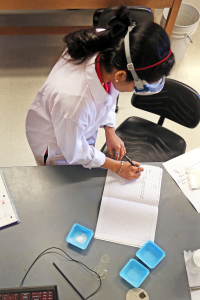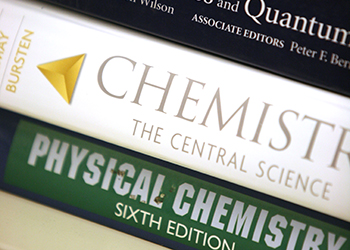
Undergraduates are strongly encouraged to participate in research projects with a faculty mentor, which can be taken for course credit or as a paid summer internship. Such projects provide outstanding professional development opportunities. Become a published author and present your work at national scientific meetings! Roughly 90% of our chemistry majors have completed a research project in the last seven years, resulting in 20 papers with undergraduate co-authors.
Research opportunities include:
CHEM 3954, Introduction to Research: 1-credit seminar course that introduces students to departmental research and develops research-relevant skills, such as how to navigate chemistry research literature and how to read research papers critically
CHEM 4710/4720, Advanced Integrated Laboratories: Students design and develop methods to probe important chemical questions, using techniques from across chemistry
CHEM 4956, Undergraduate Research in Chemistry: Research project conducted under the direction of a faculty adviser (up to 6 credits can count towards the major)
Summer Research Fellowships: The department offers several paid research fellowships to undergraduate students in the summer, including a Kroeff Fellowship, a Mary Jane Moyer Fellowship and up to 10 TWD Fellowships. The best way to get involved is to find a faculty member whose research you are interested in and finding out what opportunities are available in their research labs. Faculty can then nominate students for fellowships.
Examples of undergraduate projects:
- Design and Synthesis of Cofacially Stacked Systems for Application as Molecular Wires
- Computational Chemistry with Next Generation Supercomputers
- A New Synthetic Route to Metal-Peroxynitrito Complexes
- New Molecules for Electroluminescent Devices
- Synthetic and Mechanistic Study of Ruthenium-Catalyzed Reactions
- Photochemically Removable Protecting Groups for Biological Applications
- Applications of Molecular Recognition for Chromatographic Applications
- Preparation and Biophysical Characterization of Strategically Modified Heme Proteins
- Chemistry at 4K: Studies of Iso-Halons and Other Transient Intermediates
- Structure, Dynamics and Ligand Interactions of Proteins



